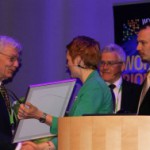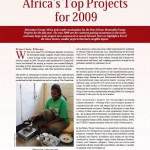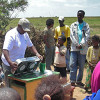The World Bioenergy team interviewed PGI Executive Director Harry Stokes in January 2014 to follow up on his 2012 win of the Award for his decades of global household energy work. The dedicated work of Harry Stokes and PGI serve today as a model for future World Bioenergy Award nominees.
Project Gaia Co-Founder and Executive Director Harry Stokes was presented the 2013 Eisenhower Humanitarian Award by the Rotary Club of Gettysburg, Pennsylvania for his leadership of the global clean fuel initiative Project Gaia, Inc. The award’s significance goes beyond just … Continued
May 29, 2012 Harry Stokes of Project Gaia was announced the winner of 2012 World Bioenergy Award on May 29 in Jönköping, Sweden. Harry was selected by the World Bioenergy Association jury out of six finalists including entrepreneurs, government officials and … Continued
Alternative Energy Africa magazine took reader nominations for the best African renewable energy projects for the past year. The year 2009 saw the continent gaining momentum in the sector and many large-scale projects were announced or moved forward. Here we … Continued
On March 16, Project Gaia won the 2010 Sustainable Biofuels Award for Adoption at the World Biofuels Markets Conference in Amsterdam. In the past, this award has been given to government, a municipal vehicle fleet or a new user who … Continued
Tonight, the world’s leading green energy prize awarded £20,000 for a pioneering sustainable energy project to the Gaia Association, an organization working with the UNHCR in the Kebribeyah refugee camp near Ethiopia’s border with Somalia. The Ashden Awards prize was … Continued
Today the world’s leading green energy prize announced that pioneering renewable energy projects from Africa, Asia, and Latin America will each receive prizes of up to £20,000, with an overall Energy Champion winning up to £40,000. Winners will be revealed … Continued
The award was given in recognition of Project Gaia’s dedication, commitment, and investment in demonstrating the impact of household energy interventions and in improving peoples’ health, livelihood, and quality of life by reducing IAP. At its third Biennial Forum, held … Continued








